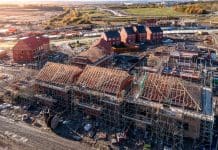The RICS UK Construction Monitor for Q4 2024 shows that construction is expected to pick up over the next 12 months
The report shows that the UK construction activity trend is anticipated to grow stronger this year.
The monitor shows that activity in Q4 2024 has remained stable.
Headline workloads have dipped slightly.
In spite of this dip, optimism remains high as the dip is only marginal, and there is a disparity between Headline Workloads (dropping to -1%) and Repair and Maintenance (up to +13%).
Credit conditions are still cited to be a barrier for respondents to the RICS UK Construction Monitor, and is highlighted by the decline in the net-balance dropping to -22%, a drop of 10% from Q3 2024 to Q4.

62% of respondents said that financial constraints were among the largest concerns for their operation, closely followed by planning and regulation issues, and labour shortages.
Still, the net balance of workload expectations for UK construction activity has not shrunk much, going from +24% in Q3 2024 to +20% in Q4, with infrastructure expected to remain the strongest performing in the sector at +30%, with +20% for private residential, and +15% for private non-residential. 64% of respondents expected energy to be the fastest-growing in infrastructure.
Profit margin expectations have seen an unfortunate fall from -3% to -7%, but this is still considered to be only marginally negative. Employment expectations have also stayed strong at +18%.
“Skills and labour shortages continue to undermine projects”
RICS have continued to monitor the state of the industry and highlight issues within it that desperately need to be addressed.

One such example comes from last November, when RICS released a report into sustainability, finding that green building skills were “lacking” over the previous 12 months.
The report suggests that the little-to-no incentive offered to firms remains a large barrier, as sustainable construction practices can often be more expensive or require more skills, which is a further issue in the form of a lack of green construction skills training.
RICS chief economist, Simon Rubinsohn, said: “Although the overall tone of the latest RICS Construction Monitor is a little subdued, the more positive assessment of the outlook foreshadowed, at least in part, some of announcements the Chancellor made in her recent speech.
“That said, respondents to the survey continue to highlight just how important it is to follow through on the plans to address some of the barriers presented by the current planning regime. Moreover, contributors also once again raise the issue of capacity when it comes to delivering on the ambitious goals of the government. Labour shortages continue identified as a meaningful obstacle to getting Britain building.”
RICS president, Justin Sullivan, said: “Whilst the latest findings reveal that the market remains stable, albeit subdued, when looking to the future, workload expectations remain upbeat. Infrastructure is still anticipated to be the strongest performing sector, which has been the case for several quarters.
“Skills and labour shortages continue to undermine projects, causing delays and costs to overrun. There is a particular shortage of Quantity Surveyors. Addressing these shortages requires a strategic approach, investing in skills training, education and long-term workplace development. RICS is committed to assisting the UK Government close the skills gap, which, among other important factors, is crucial for it realising its ambitious building targets”.














